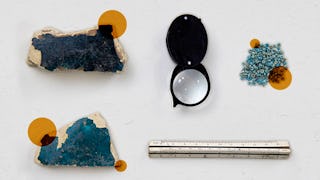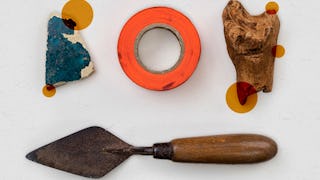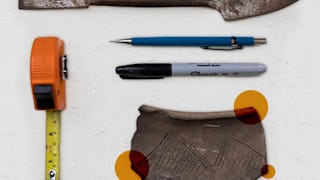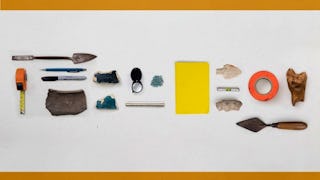This course is the second in a series on the discipline of Archaeology. It is intended for learners at all stages, including advanced high school, college students, or life-long learners. Basic information about Archaeology and its history are presented in the previous introductory course. This course covers scientific methods commonly used by archaeologists. The following two courses teach about forms of interpretation and contemporary social issues that archaeologists engage with.


Introduction to Archaeology : Archaeology as Science
本课程是 Introduction to Archaeology 专项课程 的一部分

位教师:Molly Morgan
包含在 中
您将获得的技能
要了解的详细信息

添加到您的领英档案
33 项作业
了解顶级公司的员工如何掌握热门技能

积累特定领域的专业知识
- 向行业专家学习新概念
- 获得对主题或工具的基础理解
- 通过实践项目培养工作相关技能
- 获得可共享的职业证书

该课程共有7个模块
Welcome to "Archaeology as Science" course! Here, we'll explore how archaeologists use scientific methods to uncover the mysteries of the past. From excavation to remote sensing, we'll dive into the tools and techniques they use to reconstruct past behaviors and understand human settlement patterns. Join us on this fascinating journey into the world of archaeology!
涵盖的内容
2个视频4篇阅读材料1个插件
In "The Science of Living Spaces" module, we'll explore the history behind a plantation house built in the 1830s by enslaved people. Using historical documents and archaeology, we'll investigate the lives of those who lived and worked there, including the impact of the convict leasing system after emancipation. Join us to expand your knowledge of the past and honor their lives!
涵盖的内容
6个视频6个作业1次同伴评审1个讨论话题
Hey there! Are you curious about how scientists uncover clues about past environments? Ever wonder what the world looked like thousands of years ago? If you answered yes, then you're in the right place! In this module, we'll explore the fascinating science of paleoenvironments and human ecology. Discover how archaeologists use various types of materials to reconstruct past environments, from ancient sediments to human artifacts. Get ready to delve into the mysteries of the past and learn about the incredible techniques used to unravel them!
涵盖的内容
6个视频6个作业1次同伴评审1个讨论话题
In this module, we'll explore the science of the human diet. We'll study ancient animal bones, biomolecules, and stable isotopes to understand how food has shaped our past. We'll also look at the cultural significance of food, from cooking to societal changes. As we investigate human diets, we'll find out how they relate to environmental shifts, population dynamics, and cultural evolution. We'll also discover how ancient people weathered climate change and adapted to new environments. From declines in human health associated with transitions to farming to the intricacies of daily life, the foods we eat can reveal a wealth of information about our ancestors. Finally, we'll explore how trade networks have moved plants, animals, and people across the world throughout history. So join us on this fascinating journey through the archaeology of human diets and discover how food has shaped our past and present.
涵盖的内容
6个视频7个作业1次同伴评审1个插件
Welcome to "The Science of Landscape," where we explore how landscape archaeology and settlement studies can help us better understand our shared history. From analyzing natural resources to shedding light on dynamic relationships between sites, we'll delve into the interdisciplinary methodologies that facilitate comprehensive analyses of large-scale data sets and spatial relationships. Let's enrich our understanding of past societies and the complex networks of influence that shaped human history!
涵盖的内容
5个视频5个作业1次同伴评审1个讨论话题
Hey there! Are you fascinated by the mysteries of the past? Do you ever wonder how archaeologists can accurately determine the age of artifacts? If so, then you're in for a treat! Welcome to "The Science of Time" - a module dedicated to exploring the fascinating world of chronologies and dating techniques used by archaeologists to unravel the secrets of our ancestors. From relative dating methods, which help us determine the order of materials in a sequence, to absolute dating techniques that assign specific dates to artifacts, this module will take you on a journey through the evolution of these scientific techniques. Get ready to uncover the secrets of stratigraphy, typological sequences, and more! Join us as we dive deep into the science of time and discover the incredible stories hidden within the artifacts of the past.
涵盖的内容
6个视频7个作业1次同伴评审1个讨论话题
Hey there! It was great having you in Archaeology as Science, the second part of the Introduction to Archaeology specialization. Hope you enjoyed learning about excavation, geoarchaeology, landscape studies, dating techniques, and other kinds of research archaeologists engage in to investigate the past. Now that you know how datasets are built to record living spaces, entire landscapes, and the passing of time, it's time to take a step further. Our next course, Archaeology as Reconstruction of the Past, will be even more exciting as we learn about how archaeologists study identity through the remains of past foodways, how ancient people understood sacred spaces, and how we can learn about the transition to farming. These examples and more will be covered in the next course in the Knowing the Past series. I hope you'll join me for the next adventure in the fascinating world of archaeology!
涵盖的内容
1个视频2个作业1次同伴评审
获得职业证书
将此证书添加到您的 LinkedIn 个人资料、简历或履历中。在社交媒体和绩效考核中分享。
位教师

从 Governance and Society 浏览更多内容
 状态:免费试用
状态:免费试用Rice University
 状态:免费试用
状态:免费试用Rice University
 状态:免费试用
状态:免费试用Rice University
 状态:免费试用
状态:免费试用Rice University
人们为什么选择 Coursera 来帮助自己实现职业发展




常见问题
To access the course materials, assignments and to earn a Certificate, you will need to purchase the Certificate experience when you enroll in a course. You can try a Free Trial instead, or apply for Financial Aid. The course may offer 'Full Course, No Certificate' instead. This option lets you see all course materials, submit required assessments, and get a final grade. This also means that you will not be able to purchase a Certificate experience.
When you enroll in the course, you get access to all of the courses in the Specialization, and you earn a certificate when you complete the work. Your electronic Certificate will be added to your Accomplishments page - from there, you can print your Certificate or add it to your LinkedIn profile.
Yes. In select learning programs, you can apply for financial aid or a scholarship if you can’t afford the enrollment fee. If fin aid or scholarship is available for your learning program selection, you’ll find a link to apply on the description page.
更多问题
提供助学金,



